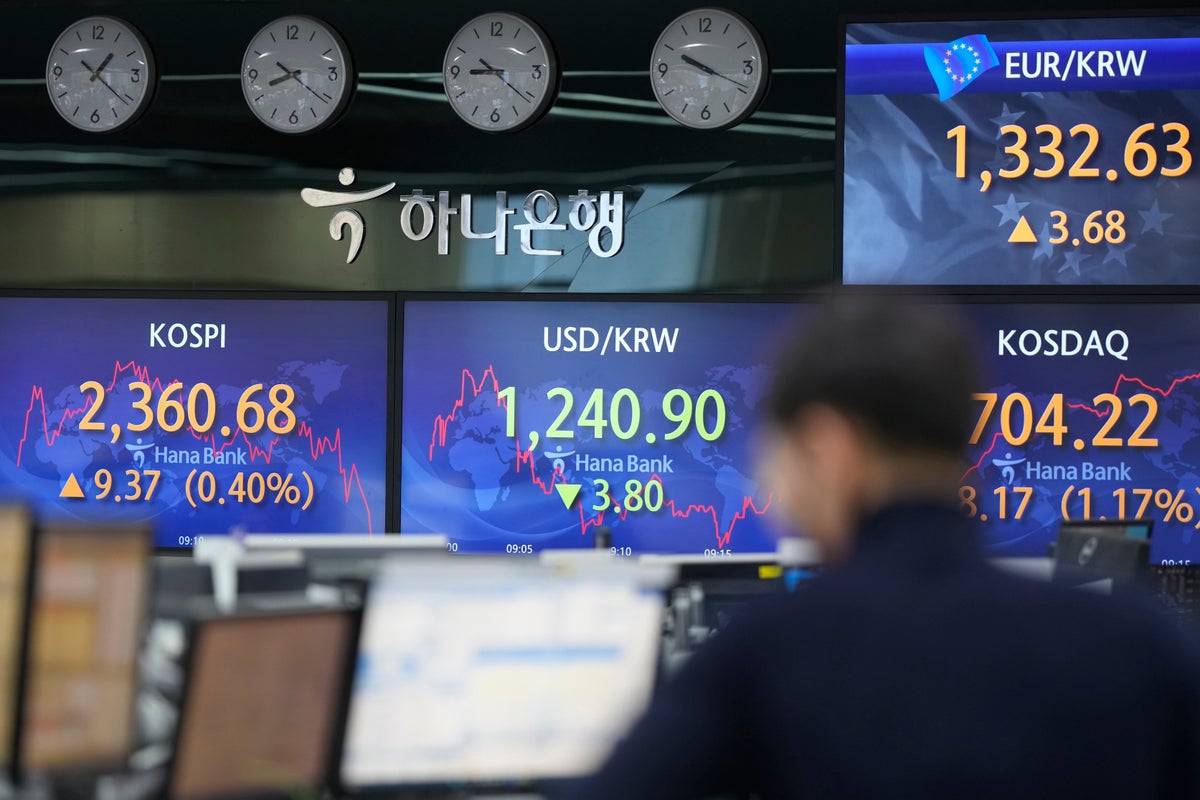
Asian shares were mostly higher Wednesday, boosted by a rally on Wall Street that came ahead of some potentially market-moving reports due later in the week.
The weak yen also piqued buying sentiment in Japan, as that boosts the earnings of the nation's exporters when converting overseas profits into yen.
Japan's benchmark Nikkei 225 rose 1.0% to finish at 26,446.00. Australia's S&P/ASX 200 gained 0.9% to 7,195.30. South Korea's Kospi edged up 0.4% to 2,359.53. Hong Kong's Hang Seng rose 0.4% to 21,408.65, while the Shanghai Composite dipped 0.2% to 3,161.84.
Shares of Fast Retailing Co., which operates the popular Japanese Uniqlo clothing retailer, rose 1.4% in morning trading after the company announced that it was raising the salaries of its workers by up to 40%.
The move is aimed at “greatly strengthening its investment in personnel, remunerating each and every employee appropriately for their ambition and talents, as well as increasing the company’s growth potential and competitiveness in line with global standards,” the company said in a statement.
On Wall Street, the S&P 500 rose 0.7% to 3,919.25 after drifting between small gains and losses through the day. The Dow Jones Industrial Average gained 0.6% to 33,704.10, and the Nasdaq composite climbed 1% to 10,742.63.
The stock market has had a positive start to 2023 helped by hopes that cooling inflation and a slowing economy may convince the Federal Reserve to ease off its markets-shaking hikes to interest rates. Since early last year, the Fed has been raising rates at a furious pace to bring painful inflation under control. Such moves risk causing a recession and hurt investment prices.
Investors were hoping for some clues about where the Fed is heading from its chair, Jerome Powell, who spoke at a forum in Stockholm on Tuesday. But he gave little news about rates.
The next big event for markets is likely Thursday’s update on December U.S. inflation at the consumer level. Economists expect it to show price gains slowed further, to 6.5% from 7.1% in November and from a peak of more than 9% in the summer.
A worse-than-expected reading could dash the building hopes on Wall Street that the Fed may stop its hikes soon and perhaps even cut rates by the end of the year. Some investors see the economy successfully walking the tightrope of slowing enough to snuff out high inflation but not so much as to cause a painful recession.
Past rate increases and high inflation have already hurt economic activity around the world, and the Fed has pledged to keep rates high for a while to ensure the job is done on inflation. It doesn't envision any rate cuts until 2024.
The World Bank said Tuesday the global economy will come “perilously close” to a recession this year in its annual report.
It usually takes a while for rate hikes to be fully felt in the economy. That could push a recession off to the second half of the year, said Barry Bannister, chief equity strategist at Stifel. The global economy could also benefit from strengthening in China, as it removes restrictions meant to keep COVID-19 at bay but that also hurt its economy.
“You’re looking at a pretty good six months where things get better at the margins and then trouble starts to rear its head,” Bannister said.
In the meantime, big U.S. companies will begin showing investors later this week how much profit they made during the last three months of 2022. Hot inflation has been squeezing customers’ wallets and raising costs for businesses, threatening their earnings.
Macy’s and several businesses have already given warnings about their results for the fourth quarter of 2022 and into 2023. Job cuts are also continuing at tech-oriented companies, a notable soft spot in what's otherwise been a healthy U.S. job market.
Several big banks are scheduled to report their results for the latest quarter on Friday, including Bank of America and JPMorgan Chase. Delta Air Lines and UnitedHealth Group will also report results on Friday. Analysts are forecasting this may mark the first year-over-year drop in earnings per share for S&P 500 companies since 2020.
In energy trading, benchmark U.S. crude sank 71 cents to $74.41 a barrel in electronic trading on the New York Mercantile Exchange. It gained 49 cents to $75.12 a barrel on Tuesday. Brent crude, the international standard, lost 70 cents to $79.40 a barrel.
In currency trading, the U.S. dollar rose to 132.30 Japanese yen from 132.13 yen. The euro cost $1.0750, up from $1.0737.
___
AP Business Writers Damian J. Troise and Stan Choe contributed to this report.
Yuri Kageyama is on Twitter: https://twitter.com/yurikageyama







